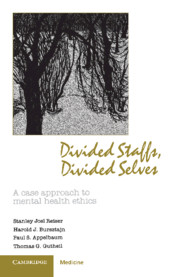Book contents
- Frontmatter
- Contents
- Acknowledgments
- About the authors
- 1 Introduction
- 2 New problems, new ethics: challenging the value structure of health care
- 3 Conflict and synthesis: the comparative anatomy of ethical and clinical decision making
- 4 Solving clinical puzzles: strategies for organizing mental health ethics rounds
- CASES IN MENTAL HEALTH ETHICS
- Bibliography
- Index
2 - New problems, new ethics: challenging the value structure of health care
Published online by Cambridge University Press: 06 July 2010
- Frontmatter
- Contents
- Acknowledgments
- About the authors
- 1 Introduction
- 2 New problems, new ethics: challenging the value structure of health care
- 3 Conflict and synthesis: the comparative anatomy of ethical and clinical decision making
- 4 Solving clinical puzzles: strategies for organizing mental health ethics rounds
- CASES IN MENTAL HEALTH ETHICS
- Bibliography
- Index
Summary
In the middle of the 1960s, a revolution took place that pushed away the veil shrouding the ethical dilemmas of health care. It exposed not abuse, but misunderstanding, and a widespread unawareness of the ethical context of the relationships among medical personnel, patients, and society. Without some knowledge of this revolution in general medicine, the related developments in mental health cannot be fully understood.
HEALTH CARE AS A RIGHT
The ethics movement was the outcome of multiple events, linked by their focus on rights. Particularly important was the effort at the beginning of this century to equalize the quality of care among the diverse strata of American society.
A traditional attitude in the United States toward social provision of health care had been that meeting the basic needs of life was the responsibility of the individual. Society would intervene when an illness posed a long-term threat to a person's health, the care for the disease was time-consuming and placed substantial burdens on the family, or the disease posed a danger to the community. By these definitions, persons afflicted with tuberculosis, mental illness, and retardation were candidates for social support, and many hospitals were built during the 19th and 20th centuries to treat these disorders. Society also responded to the general medical needs of the poor by constructing institutions for their care: Indigency was a condition that legitimized social intervention.
The movement to give people broad access to health care, regardless of their specific illness or financial state, met with continued resistance from the time it began in the early 20th century right up to 1960.
- Type
- Chapter
- Information
- Divided Staffs, Divided SelvesA Case Approach to Mental Health Ethics, pp. 3 - 16Publisher: Cambridge University PressPrint publication year: 1987



